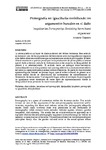Pornografía no igualitaria: revisitando los argumentos basados en el daño

Ver/Abrir
Use este enlace para citar
http://hdl.handle.net/2183/30923
Excepto si se señala otra cosa, la licencia del ítem se describe como Atribución-NoComercial-CompartirIgual 4.0 Internacional (CC BY-NC-SA 4.0)
Colecciones
Metadatos
Mostrar el registro completo del ítemTítulo
Pornografía no igualitaria: revisitando los argumentos basados en el dañoTítulo(s) alternativo(s)
Inegalitarian Pornography: Revisiting Harm-Based ArgumentsAutor(es)
Fecha
2021-12-31Cita bibliográfica
Chaparro, A. (2021). Pornografía no igualitaria: revisitando los argumentos basados en el daño. Atlánticas. Revista Internacional de Estudios Feministas, 6(1), 136-164. https://doi.org/10.17979/arief.2021.6.1.6940
Resumen
[Resumen] La pornografía es un lugar de disputa dentro del debate feminista. Este artículo se centra en uno de los argumentos del feminismo anti-pornografía con respecto a los daños directos e indirectos que supuestamente causa la pornografía. El daño directo involucra a quienes participan en la producción de pornografía; mientras que el daño indirecto incluye la violencia contra las mujeres; la desigualdad de género y el silenciamiento. El artículo tiene un enfoque ético-normativo, profundizando en si el argumento anti-pornografía es lo suficientemente sólido, así como su capacidad para plantear contra-objeciones. Se parte de dos nociones epistemológicas básicas: en primer lugar, que el orden cultural de género es el ámbito social donde se reproducen las expresiones de subordinación en detrimento de las mujeres. Y en segundo lugar, sobre el concepto de pornografía no igualitaria como distinción de otros tipos de representaciones donde la desigualdad no se presenta de manera sexualizada. [Abstract] Pornography is a space of contention within the feminist circles. This article focuses on one of the arguments of the anti-pornography movement within feminism regarding the direct and indirect harms that pornography allegedly causes. Direct harm involves those who participate in the production of pornography; while indirect harm includes violence against women; gender inequality, and silencing. The article has an ethical-normative approach as it explains whether the anti-pornography argument is sound enough as well as its capacity to raise counter-objections. The analysis is based on two epistemological principles: firstly, that the gender cultural order is the social sphere where expressions of subordination are reproduced to the detriment of women; and, secondly, that inegalitarian pornography contributes to gender inequality by eroticising relations of violence and subordination, in contrast to other forms of gender representation in which inequality is not depicted in a sexualised way.
Palabras clave
Daños
Feminismo anti-pornografía
Desigualdad de género
Pornografía no igualitaria
Ética feminista
Harm to others
Anti-pornography feminism
Gender inequality
Inegalitarian pornography
Feminist ethics
Feminismo anti-pornografía
Desigualdad de género
Pornografía no igualitaria
Ética feminista
Harm to others
Anti-pornography feminism
Gender inequality
Inegalitarian pornography
Feminist ethics
Descripción
Este artículo forma parte del monográfico titulado Pornografía: una geografía sexual del poder
Versión del editor
Derechos
Atribución-NoComercial-CompartirIgual 4.0 Internacional (CC BY-NC-SA 4.0)
ISSN
2530-2736






